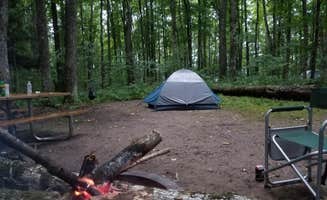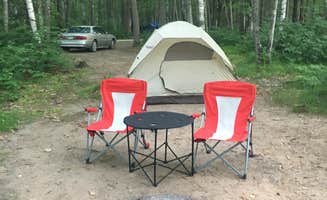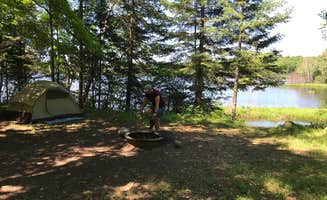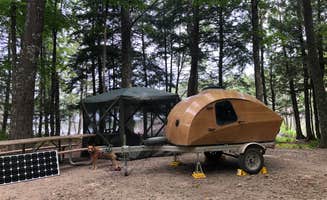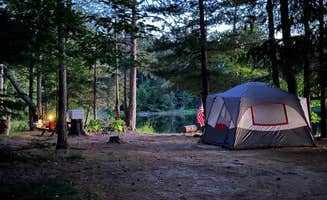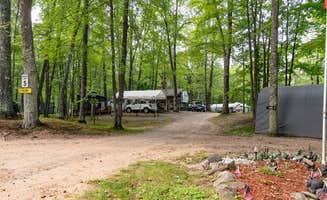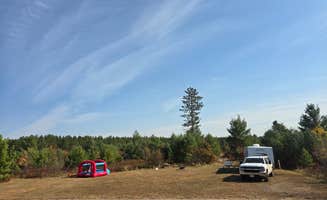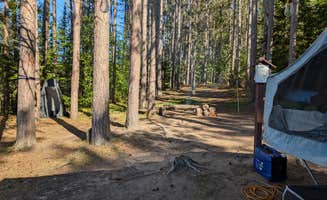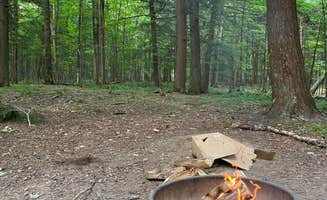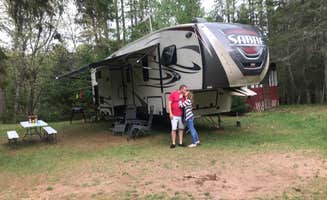The Long Lake area of northern Wisconsin contains 18 lakes and many streams within the Chequamegon National Forest. Campsites near Long Lake, Wisconsin typically sit at elevations between 1,600 and 1,700 feet, experiencing temperature swings from daytime highs in the 70s to nighttime lows in the 40s even during summer months. Several campgrounds offer vault toilets with hand pumps for water access, though campers often collect drinking water from the artesian well at Chipmunk Rapids.
What to do
Beach access and swimming: The water at Franklin Lake Campground stays crystal clear throughout the summer. "Private sites, great beach, beautiful buildings built by the CCC. There is even a small nature center," notes reviewer Kay K. The beach area includes a sandbar directly across from the shore which offers the best swimming according to regulars.
Hiking trails: Multiple walking paths connect the various campgrounds. At Laura Lake Recreation Area, "Hiking trail around the lake, well marked and easy to do," according to Artem I. Laura Lake features a scenic peninsula about 50 yards from the campsites where visitors gather to watch sunsets.
Fishing opportunities: Both lakes and streams offer fishing throughout the region. The Pine River near Lost Lake Campground provides "prime for trout fishing" according to Rachel C. Most lakes allow small boats, with some restricting motors to electric-only to preserve water quality and quiet environment.
What campers like
Artesian well water: Located at Chipmunk Rapids Campground, the artesian well draws visitors from surrounding campgrounds. "The best feature is the artesian well right at the entrance. We filled up with water and the line started just as we finished. Even if you camp elsewhere the water is worth a visit," says Art S. The well provides drinking water superior to most pump stations.
Secluded camping experience: Despite being popular, many sites maintain a private feel. At Perch Lake Walk-in Campground, "The sites still feel very secluded and private. There is a fire ring and picnic table at each site," reports Kirsty G. The short hike-in requirement creates an additional buffer from crowds and noise.
Wildlife viewing: The forests and waterways support diverse animal populations. At Chipmunk Rapids, camper Adam reports, "Lots of deer and turkeys. Heard wolves at night." The relatively undeveloped shorelines create natural wildlife corridors, especially in early morning and evening hours.
What you should know
Bear safety required: Bears inhabit the region, making proper food storage essential. At Perch Lake, "There is no bear box and there definitely are bears (during one camping trip some hunters treed and shot a bear in the early morning and we saw them carrying it while hiking out) so you'll want to hang your food," warns Kirsty G.
Insect preparation: Beyond what's mentioned in the existing description, mosquitoes can be particularly intense. At Franklin Lake, Sue B. reported they were "chased out by mosquitoes after first one" night despite planning a longer stay. Ticks remain active through September, requiring daily checks.
Primitive facilities: Most campgrounds provide only basic amenities. Stevens Lake Campground has a hand pump for water but limited facilities otherwise. Max S. notes, "Free water is available via a hand pump" but also warns about "Poor cell service for AT&T."
Tips for camping with families
Water activities: Lakes with beaches provide ideal settings for children. At Lost Lake Cabins, Robert C. explains the setup is ideal for families: "It was a really nice place to go to introduce the kids to the camping experience while they're young without having to pitch a tent or 'rough it' right away." The cabins sleep multiple people with shared common areas.
Charging options: When camping without electric hookups, community buildings sometimes offer alternatives. At Franklin Lake, a camper discovered: "For those without power there is outlets in shelter in middle of campground to charge batteries."
Educational opportunities: Nature centers provide learning experiences during weather breaks. Franklin Lake features a "small nature center" and a nature trail that "takes us through bogs and past maiden hair ferns," according to Kay K. The trail system is designed for all skill levels.
Tips from RVers
Site selection: RV campers should research specific sites before booking. At Bewabic State Park Campground, Pat H. notes "There are a lot of sites to choose from, but it's a tight squeeze in some sites." Loop A gets particular praise as "nice and wooded and private" while the larger loop has sites positioned much closer together.
Loop recommendations: Specific campground sections offer better amenities. Brandon B. recommends "The B loop is close to hot showers and clean bathrooms. Plenty of room between neighbor campers." These facilities become particularly important during extended stays or rainy weather.
Water fill stations: Since most campgrounds lack water hookups, RVers should plan accordingly. Suzanne B. advises: "There is a dump station there. They have electrical hook-ups but no water hook-ups you have to fill before you come in." The artesian well at Chipmunk Rapids provides an excellent water source when entering the area.


